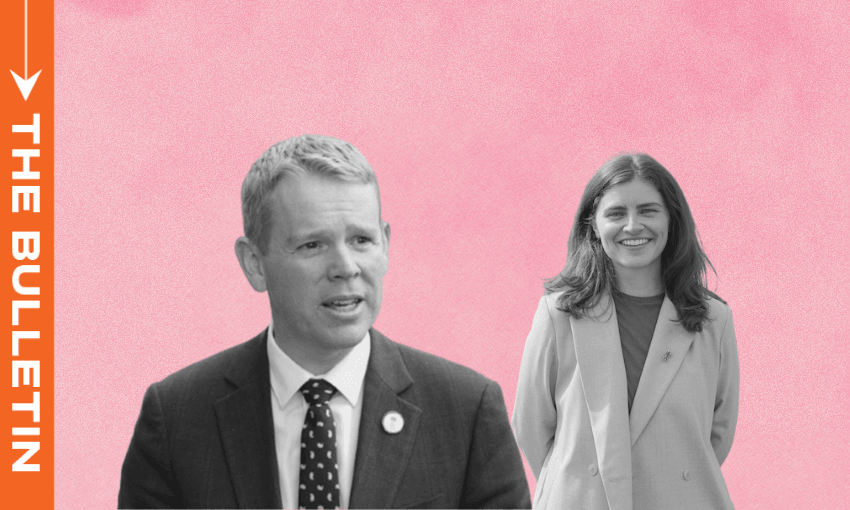Leaders from three of the biggest political parties addressed party faithful over the weekend, writes Stewart Sowman-Lund in this extract from The Bulletin. To receive The Bulletin in full each weekday, sign up here.
A weekend of speeches
It’s been a big weekend in politics, with scene-setting speeches from the leaders of three major political parties. In Palmerston North, Christopher Luxon addressed party faithful in a, well, fiery speech filled with appropriately fiery metaphors – such as comparing Labour in opposition to arsonists “returning to the scene of a fire that they started”. In Auckland, Chris Hipkins also addressed party supporters at a regional conference, lobbing criticism back at the government for a “shambolic start to the parliamentary term”. And on the same day, the Green Party co-leaders delivered their annual “state of the planet” address, accusing the coalition of implementing “divisive, stale, cruel and ineffective” policies. Stuff’s Glenn McConnell has a handy wrap of the three speeches here.
The state of the Greens
The Greens have faced anything but a comfortable ride into opposition, losing co-leader James Shaw and weathering three separate MP scandals. On TVNZ’s Q+A yesterday morning, new co-leader Chlöe Swarbrick faced tough questions about the way her party has handled those incidents. Host Jack Tame read quotes from a Privileges Committee report into National MP Tim van de Molen, who was suspended from his portfolio roles last year, asking Swarbrick who the comments referred to. “You tell me,” said Swarbrick at first, before mistaking it as referring to Julie Anne Genter’s recent outburst in parliament. Nevertheless, Swarbrick said the two circumstances were different, but wouldn’t rule out further consequences for Genter. “We are working through the Privileges Committee process.” In the same interview, Swarbrick was asked about the lengthy ongoing investigation into another MP, Darleen Tana, who has been suspended with pay for nearly 10 weeks. “That’s actually unfortunately out of my hands,” said Swarbrick. “We operate in a world and we operate in a country where somebody is innocent until proven guilty. There is a reason that we have an independent expert investigator undertaking this work and natural justice has to be the priority.”
Swarbrick promises more activism from the Greens under her leadership
Tame also asked Swarbrick how her approach to leadership will differ from her predecessor, particularly around climate policy. “I’m probably… a little more comfortable in the activism space [than Shaw],” said Swarbrick, who defended activism as a “very legitimate” approach to achieving change. “Communities need to mobilise and not leave politics to the politicians such that we get the outcomes that all of us deserve.” In the state of the planet address, which you can read in full here, co-leader Marama Davidson described the Greens as an alternative to the “cynical, cruel” government, and challenged the coalition to put people at the heart of its forthcoming budget. “If they don’t, they are holding back the potential of our people and our communities to thrive.”
Hipkins paints a vision for 2040
A new poll on Friday once again showed the left bloc above the right, as The Post’s Thomas Manch reported. Chris Hipkins capitalised on this fraying view of the government during a speech in Auckland yesterday, setting out his vision for New Zealand in 2040. That’s the same year Christopher Luxon chose to focus on in his recent pre-budget speech, because it will be 200 years since the signing of the Treaty of Waitangi. Hipkins said he hoped that the moment we are now in would be a “turning point” for the country, “a time when we decided that this isn’t as good as it gets, that we didn’t have to accept growing inequality, environmental degradation, run down public services, and ever lower standards of living as inevitable”. But as Newsroom’s Laura Walters noted, there were no surprises, nor policies, found in his speech. Instead, Hipkins took aim at the current public sector cuts and said Labour would get New Zealanders back into work, while also painting a picture of a clean, green country with better transport, health and lower housing costs. What he didn’t talk about was tax – he only mentioned it in passing, noting that under his vision of 2040, “mega landlords” will pay their fare share. The Herald’s Thomas Coughlan wrote over the weekend about the big questions Labour will have to answer when setting its 2026 election tax policy, including whether to reignite the capital gains debate once again. For now, it would appear Labour is in no rush to reopen that can of worms.


